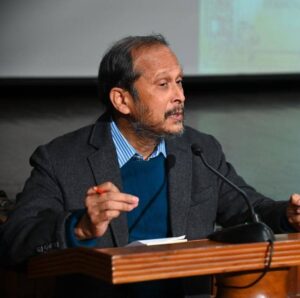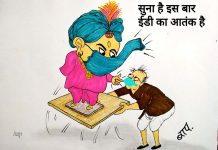— Nalini R Mohanty —
Article 19(1) (a) of our Constitution enshrines that speech even provocative, offensive, or unsettling, is the citizen’s shield against tyranny, writes Sanjay Hegde, while castigating Allahabad High Court for not giving relief to Rahul Gandhi on his remark about Indian army’s plight at the hands of the Chinese forces
At a time when the Constitutional right to freedom of speech is under severe attack from both the executive and the the judiciary in our country, I read a stirring plea in defence of that freedom in The Hindu by Sanjay Hegde. Hegde, a senior advocate of the Supreme Court of India, ripped apart the judiciary for turning the judicial metric on its head while taking decisions on the violation of the citizens’ rights by an authoritarian executive.
The usual pattern is like this: whenever there is any trenchant criticism of the government or its leader on the social media ( the legacy media do not anymore permit such criticism on their platforms), some from the ruling party’s troll army lodge a complaint with the police that they have been hurt by the remark; the police loses no time in taking cognisance of it and lodging an FIR, sometimes leading to the detention of the critic. That’s when the judiciary ought to step in to chastise the police for disrespecting the Constitutional mandate. A robust judiciary would ensure that the dissenter is released and the FIR is squashed. That’s not all. A message should go out to the security agencies that any such violations of Fundamental Rights would invite serious reprisal from the highest courts of the country
But, sadly, as it stands today, such normal expectation is sheer wishful thinking. Because we are, it seems, living in abnormal times. How else do we explain the egregious conduct of first the police and then that of the high courts and the Supreme Court of the country in a series of recent cases?
Sanjay Hegde gives the example of a 24-year old man, Ajit Yadav, who called the Prime Minister ‘coward’ in a social media post after the ceasefire with Pakistan on May 10. A complaint was lodged by someone who said his sentiment was hurt by this remark. The UP police promptly lodged an FIR. Yadav moved the Allahabad High Court praying for the quashing of the FIR. But the Court rejected the plea saying that “emotions cannot be permitted to overflow to an extent that constitutional authorities of the country are dragged into disrepute.”
Commenting on this observation of the High Court, Sanjay Hegde writes: “This is a remarkable formulation. It subtly inverts the constitutional design: the citizen is no longer the source of power holding the state to account, but a child to be reprimanded for speaking too freely. Instead of interpreting Article 19(1)(a) as a liberty that limits state power, courts have begun treating it as a licence that comes with behavioural conditions — conditions defined not by law but by the perceived dignity of public figures and institutions.”
Sanjay Hegde then mentions the by-now well-known Ali Khan Mahmudabad case; he was arrested for his Facebook comments against the ruling dispensation. The Supreme Court, mercifully, granted him bail but refused to throw out the case because his comments supposedly hurt sentiments.
Hegde finds this disturbing. He writes: “Two disturbing patterns emerge from these cases. First, the judiciary is increasingly equating speech that provokes emotional reactions with legally actionable harm. This misreads the Constitution and the rationale of a democracy The test for restricting speech under Article 19(2) is not whether it angers, irritates, or offends but whether it incites violence, hatred or disrupts public order. Second, by encouraging apologies and moral policing of language, courts create a perverse incentive. The more outrage a comment generates, the more likely it is to be litigated. This does not protect society. It emboldens mobs and social litigants. It creates a market for offence.”
“This shift is starkly evident in cases that involve the armed forces,” Hegde writes. He mentions how “the Allahabad High Court denied the Leader of the Opposition, Rahul Gandhi, relief in a defamation case on his alleged derogatory remarks about the Indian Army”. First of all, it was not a criticism of the army when Gandhi had commented that Indian armed forces were roughed up by the Chinese army in Ladakh; it was a criticism of the government because it didn’t equip our army well. Moreover, why should we treat our army as a ‘holy cow’? Where criticism due, it must be laid. That does not make one a less patriot. You can’t haul up an individual just because popular sentiment is hurt.
Hegde writes: “ Courts in India must return to a principle-centric model of speech protection. Instead of obsessing over what was said, they must ask whether the speaker’s right was violated, and not someone else’s sentiment.”
He goes on to say that the courts todayare, unfortunately, creating a situation where “the signal to the ordinary citizen is clear: express only what is safe, bland and agreeable. But democracies are not built on agreeable speech. They thrive on disagreement — noisy, rude and even reckless… If India is to preserve its democratic soul, it must restore the dignity of dissent. It must not demand the dignity of the institutions at the cost of liberty. Judges are the guardians of the Constitution, and not the curators of culture. They must protect the right of the speaker and not the comfort of the listener.”
Hegde concludes by quoting Ambedkar: “The world owes much to the rebels who would dare to argue in the face of pontiff and insist that he is not infallible.”
Sanjay Hegde’s message is both chilling and inspiring; it depends on how you look at it.
Discover more from समता मार्ग
Subscribe to get the latest posts sent to your email.


















